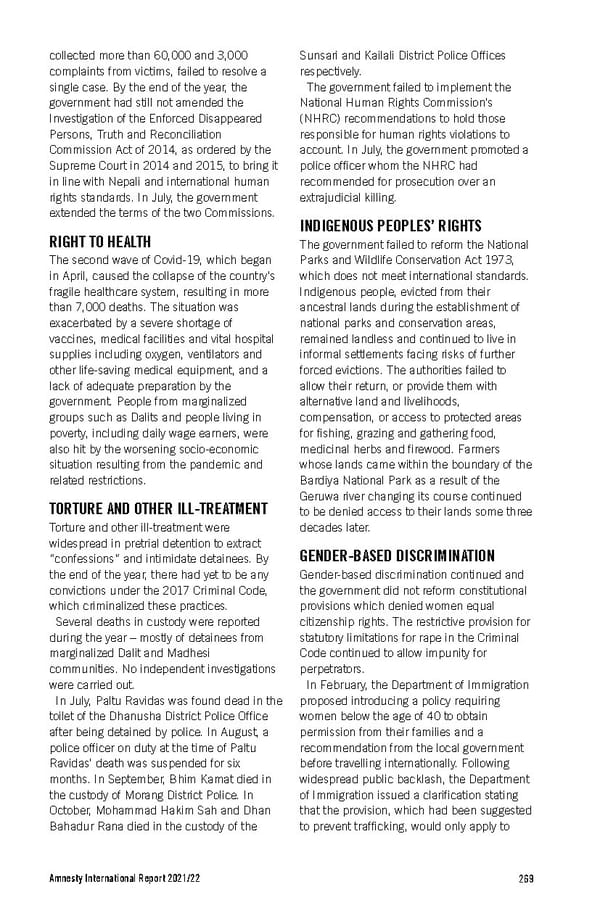collected more than 60,000 and 3,000 Sunsari and Kailali District Police Offices complaints from victims, failed to resolve a respectively. single case. By the end of the year, the The government failed to implement the government had still not amended the National Human Rights Commission’s Investigation of the Enforced Disappeared (NHRC) recommendations to hold those Persons, Truth and Reconciliation responsible for human rights violations to Commission Act of 2014, as ordered by the account. In July, the government promoted a Supreme Court in 2014 and 2015, to bring it police officer whom the NHRC had in line with Nepali and international human recommended for prosecution over an rights standards. In July, the government extrajudicial killing. extended the terms of the two Commissions. RIGHT TO HEALTH INDIGENOUS PEOPLES’ RIGHTS The government failed to reform the National The second wave of Covid-19, which began Parks and Wildlife Conservation Act 1973, in April, caused the collapse of the country’s which does not meet international standards. fragile healthcare system, resulting in more Indigenous people, evicted from their than 7,000 deaths. The situation was ancestral lands during the establishment of exacerbated by a severe shortage of national parks and conservation areas, vaccines, medical facilities and vital hospital remained landless and continued to live in supplies including oxygen, ventilators and informal settlements facing risks of further other life-saving medical equipment, and a forced evictions. The authorities failed to lack of adequate preparation by the allow their return, or provide them with government. People from marginalized alternative land and livelihoods, groups such as Dalits and people living in compensation, or access to protected areas poverty, including daily wage earners, were for fishing, grazing and gathering food, also hit by the worsening socio-economic medicinal herbs and firewood. Farmers situation resulting from the pandemic and whose lands came within the boundary of the related restrictions. Bardiya National Park as a result of the TORTURE AND OTHER ILL-TREATMENT Geruwa river changing its course continued to be denied access to their lands some three Torture and other ill-treatment were decades later. widespread in pretrial detention to extract GENDER-BASED DISCRIMINATION “confessions” and intimidate detainees. By the end of the year, there had yet to be any Gender-based discrimination continued and convictions under the 2017 Criminal Code, the government did not reform constitutional which criminalized these practices. provisions which denied women equal Several deaths in custody were reported citizenship rights. The restrictive provision for during the year – mostly of detainees from statutory limitations for rape in the Criminal marginalized Dalit and Madhesi Code continued to allow impunity for communities. No independent investigations perpetrators. were carried out. In February, the Department of Immigration In July, Paltu Ravidas was found dead in the proposed introducing a policy requiring toilet of the Dhanusha District Police Office women below the age of 40 to obtain after being detained by police. In August, a permission from their families and a police officer on duty at the time of Paltu recommendation from the local government Ravidas’ death was suspended for six before travelling internationally. Following months. In September, Bhim Kamat died in widespread public backlash, the Department the custody of Morang District Police. In of Immigration issued a clarification stating October, Mohammad Hakim Sah and Dhan that the provision, which had been suggested Bahadur Rana died in the custody of the to prevent trafficking, would only apply to Amnesty International Report 2021/22 269
 Amnesty International Report 2021/22 Page 268 Page 270
Amnesty International Report 2021/22 Page 268 Page 270